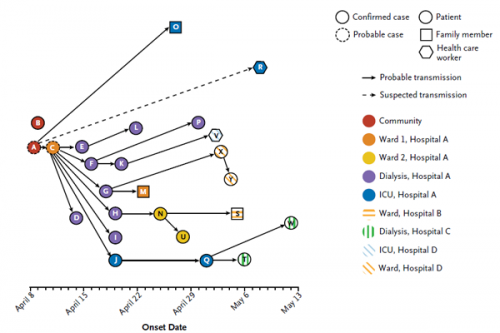Sequencing the MERS coronavirus outbreak in Saudi Arabia

(Medical Xpress)—Using deep sequencing technologies, researchers from the Kingdom of Saudi Arabia, US, Canada and the UK have shown that the novel Middle East Respiratory Syndrome (MERS) coronavirus can spread between people in healthcare settings.
By combining clinical monitoring techniques with state-of-the-art sequencing technology to study an outbreak of MERS coronavirus, the scientists discovered that transmission occurs within hospitals and can be rapidly fatal.
Of the 23 people diagnosed with the coronavirus infection in this outbreak, 65 per cent of patients have died. Until now little has been known about the origin and characteristics of this deadly new virus. By studying an outbreak in the eastern Saudi Arabian province of Al-Hasa, the teams are starting to understand the transmission dynamics, and clinical and genetic characteristics of this often fatal virus.
"We developed our rapid, deep, and whole-genome sequencing of MERS coronavirus to understand more about the genetics of this virus, and for the method to be used in any new outbreaks. This is exactly what we have been able to achieve," says Professor Paul Kellam from the Wellcome Trust Sanger Institute.
Sanger Institute researchers developed a deep sequencing technique that can rapidly sequence MERS coronavirus genomes. This technique uses the miniscule levels of viral genetic material present in patients' clinical samples taken to diagnose the infection. Coupled to bespoke computer programs this process reduces the time of genome analysis from weeks to days.
Using this technology, the researchers confirmed that the virus was being transmitted from person to person and the virus accumulated limited genetic changes consistent with it replicating within a patient and then transferring to the next. Further analysis revealed that all the coronaviruses in the outbreak came from a common ancestor that appeared between February and April 2013. These discoveries confirmed the observations of hospital staff tracking the transmission of the virus.
"By analysing the complete genomes of four MERS-coronavirus-positive samples, we found that the viruses were closely related to one another genetically - indicating that they are part of the same infection outbreak," said Dr Abdullah Al-Rabeeah, Minister of Health, Kingdom of Saudi Arabia. "The low level of sequence divergence of the virus within the Al-Hasa cluster is in concordance with the hospital epidemiological investigation, suggesting that transmission took place within this group of patients and healthcare workers."
Using this knowledge, clinicians have been able to minimise the spread of the infection and provide vital new information for helping to contain future outbreaks.
"The fact that the hospital outbreak was contained effectively and there were no more new cases reported, shows that preventive infection control measures are crucial to prevent spread of the virus," said Professor Alimuddin Zumla of University College London. "The rapid pace with which analysis of the cluster outbreak at Al-Hasa was initiated by the Saudi Arabian Ministry of Health, which enabled rapid definition of the epidemiology, identification of viral genome sequences and release of them for open use in the GenBank database, and bringing the outbreak under control, reflects the true collaborative spirit and value of effective international collaborations, which are essential to containing this virus."
Prevention of the transmission of MERS coronavirus is still a major challenge for healthcare workers. Further research into the duration of contagiousness as well as the complete spectrum of disease is needed to help healthcare workers develop and implement new strategies to tackle this growing issue.
"The Saudi Ministry of Health staff were honoured to work with local and international world leaders in hospital epidemiology, infectious diseases, virology and gene sequencing experts to understand and define the complex cluster of the novel MERS-coronavirus in the eastern region of the Kingdom of Saudi Arabia, not just to put local interventions to contain the outbreak, but also for updating and evaluating existing WHO Global Infection Control guidelines for MERS-coronavirus," said Professor Ziad Memish, Deputy Minister of Health, Riyadh, Kingdom of Saudi Arabia. "Whilst there remain many unknowns about this new lethal virus, the Saudi Ministry of Health is committed to continue its collaborative work with all national and international experts under the umbrella of the World Health Organisation to unravel the mysteries of this novel virus."
More information: Assiri, A. et al. Hospital Outbreak of Middle East Respiratory Syndrome Coronavirus, NEJM 2013. DOI: 10.1056/NEJMoa1306742












